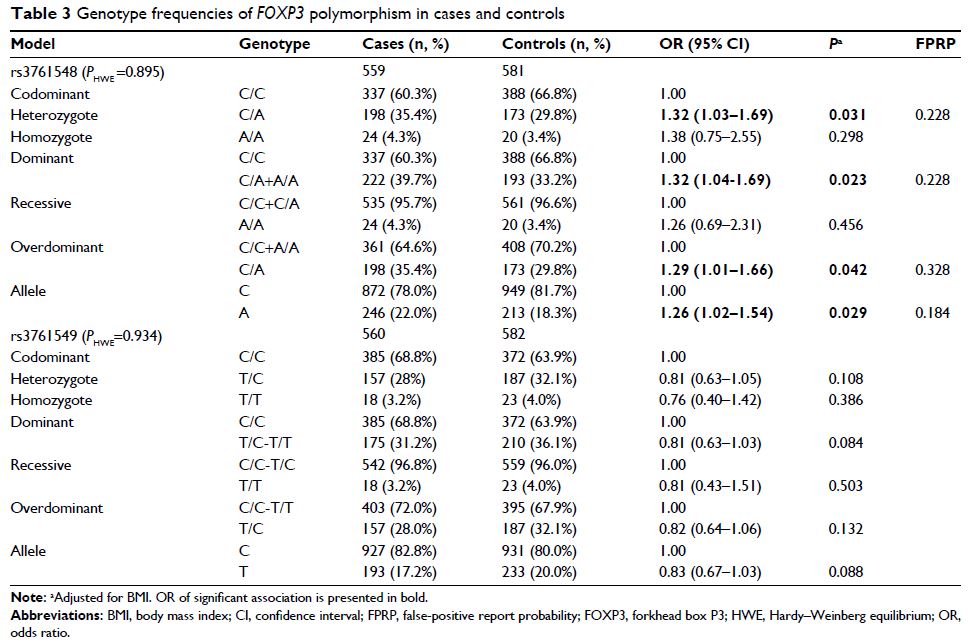108985
论文已发表
注册即可获取德孚的最新动态
IF 收录期刊
- 3.4 Breast Cancer (Dove Med Press)
- 3.2 Clin Epidemiol
- 2.6 Cancer Manag Res
- 2.9 Infect Drug Resist
- 3.7 Clin Interv Aging
- 5.1 Drug Des Dev Ther
- 3.1 Int J Chronic Obstr
- 6.6 Int J Nanomed
- 2.6 Int J Women's Health
- 2.9 Neuropsych Dis Treat
- 2.8 OncoTargets Ther
- 2.0 Patient Prefer Adher
- 2.2 Ther Clin Risk Manag
- 2.5 J Pain Res
- 3.0 Diabet Metab Synd Ob
- 3.2 Psychol Res Behav Ma
- 3.4 Nat Sci Sleep
- 1.8 Pharmgenomics Pers Med
- 2.0 Risk Manag Healthc Policy
- 4.1 J Inflamm Res
- 2.0 Int J Gen Med
- 3.4 J Hepatocell Carcinoma
- 3.0 J Asthma Allergy
- 2.2 Clin Cosmet Investig Dermatol
- 2.4 J Multidiscip Healthc

两种 FOXP3 基因多态性与中国汉族女性乳腺癌易感性的关系
Authors Tian T, Wang M, Zheng Y, Yang T, Zhu W, Li H, Lin S, Liu K, Xu P, Deng Y, Zhou L, Dai Z
Received 29 November 2017
Accepted for publication 13 February 2018
Published 26 April 2018 Volume 2018:10 Pages 867—872
DOI https://doi.org/10.2147/CMAR.S158433
Checked for plagiarism Yes
Review by Single-blind
Peer reviewers approved by Dr Colin Mak
Peer reviewer comments 3
Editor who approved publication: Dr Antonella D'Anneo
Background: Forkhead
box P3 (FOXP3 ) is a key gene in the immune
system which also plays a role in tumor development. This study aims to explore
the association of two FOXP3 polymorphisms
(rs3761548 and rs3761549) with susceptibility to breast cancer (BC).
Method: A case–control study was conducted, involving 560 patients and 583
healthy individuals from the Chinese Han population. The genotypes of FOXP3 polymorphisms were
detected using the Sequenom MassARRAY method. The association between FOXP3 polymorphisms and
BC risk was evaluated using a χ 2 test with an odds ratio (OR) and 95%
confidence intervals (95% CIs) under six genetic models. False-positive report
probability was utilized to examine whether the significant findings were
noteworthy.
Results: We observed that rs3761548 was associated with a higher BC risk in
heterozygous, dominant, overdominant, and allele genetic models (CA vs CC: OR
=1.32, P =0.031; CA/AA vs CC: OR =1.32, P =0.023; CA vs CC/AA: OR
=1.29, P =0.042; A vs C: OR
=1.26, P =0.029), whereas no significant
association was found between rs3761549 and BC risk. In addition, CA, CA/AA
genotype, and A allele of rs3761548 were related to larger tumor size, and the
A allele was also correlated with a positive status of Her-2 in BC patients.
Conclusion: Our study suggests that FOXP3 polymorphism
rs3761548 is associated with BC susceptibility in the Chinese and may be
involved in tumor progression. Future studies are needed to confirm the results
in a larger population with more races.
Keywords: forkhead box P3, polymorphism, breast cancer, risk
